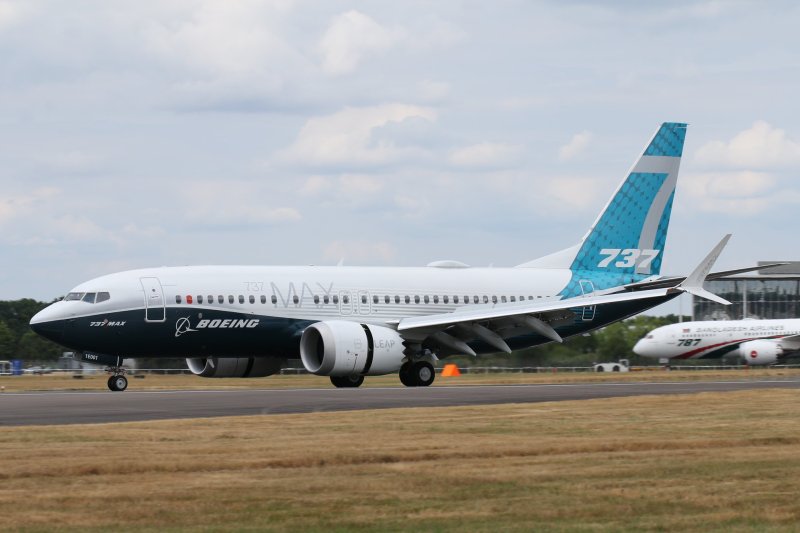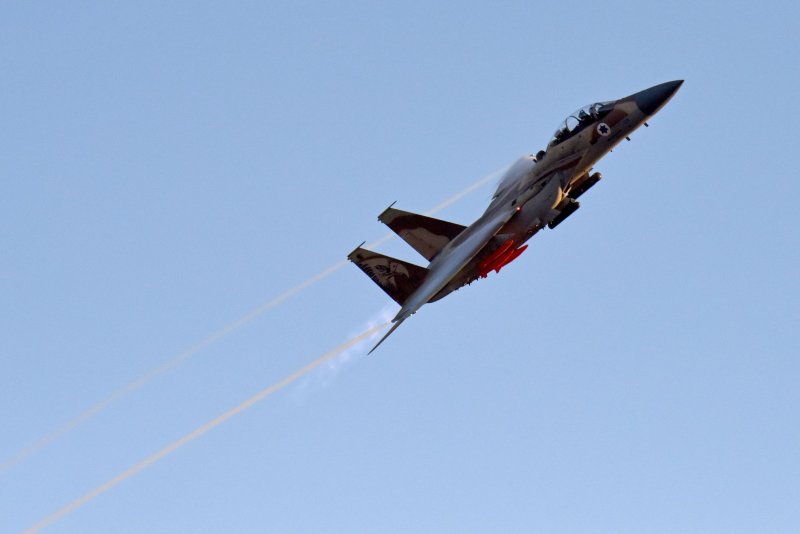Boeing lags behind rival Airbus, new data show

Boeing lags behind rival Airbus amid the grounding of the 737 Max.
File Photo by Cityswift/Flickr
Nov. 10 (UPI) -- Boeing lags behind its European aircraft manufacturing competitor Airbus, new figures show.
Airbus delivered 72 passenger aircraft in October. This figure equates to more than five times as many as U.S. manufacturer Boeing, which delivered 13 jetliners.
The Airbus deliveries ranged from the smaller 55 single-aisle passenger jets, such as the A220s and A320 family jets, to the superjumbo A380.
Deliveries included 12 A220s, 43 A320 family jets, four midsize A330s, 12 large A350s and one A380.
Smaller aircraft like the Airbus A220 reduce fuel and maintenance costs and are easier to fill up than larger planes while travel demand is still low amid the COVID-19 pandemic, according to Simply Flying. Some of the larger planes were delivered due to contractual obligations.
Meanwhile, Boeing posted zero new orders for a second straight month, according to data posted on the company's website Tuesday, days after Airbus won 11 new orders.
The U.S. aircraft manufacturer also removed another 37 Max jets from its order book. Since March 2019, the 737 Max has been grounded after two crashes killed 346 people.
Boeing cannot resume Max shipments until U.S. regulators lift a flying ban.
Boeing's net order tally for the year, including removals for the Max jet, is negative 1,020 airplanes compared with Airbus' net order total for the year of 308 aircrafts.
Nov. 10 (UPI) -- Boeing lags behind its European aircraft manufacturing competitor Airbus, new figures show.
Airbus delivered 72 passenger aircraft in October. This figure equates to more than five times as many as U.S. manufacturer Boeing, which delivered 13 jetliners.
The Airbus deliveries ranged from the smaller 55 single-aisle passenger jets, such as the A220s and A320 family jets, to the superjumbo A380.
Deliveries included 12 A220s, 43 A320 family jets, four midsize A330s, 12 large A350s and one A380.
Smaller aircraft like the Airbus A220 reduce fuel and maintenance costs and are easier to fill up than larger planes while travel demand is still low amid the COVID-19 pandemic, according to Simply Flying. Some of the larger planes were delivered due to contractual obligations.
Meanwhile, Boeing posted zero new orders for a second straight month, according to data posted on the company's website Tuesday, days after Airbus won 11 new orders.
The U.S. aircraft manufacturer also removed another 37 Max jets from its order book. Since March 2019, the 737 Max has been grounded after two crashes killed 346 people.
Boeing cannot resume Max shipments until U.S. regulators lift a flying ban.
Boeing's net order tally for the year, including removals for the Max jet, is negative 1,020 airplanes compared with Airbus' net order total for the year of 308 aircrafts.
MILITARY INDUSTRIAL COMPLEX (MIC)
Pentagon awards $734.8M to Boeing,
Pentagon awards $734.8M to Boeing,
Raytheon for support of Qatar's F-15s

An Israeli Air Force F-15 performs during a graduation ceremony of Israeli air force pilots in June. Photo by Debbie Hill/UPI | License Photo
Nov. 10 (UPI) -- The Pentagon this week awarded two contracts totaling $734.8 million for infrastructure and equipment for the Qatar Emiri Air Force.
The larger of the two deals, announced on Monday, is a $657.2 million contract for Qatar's F-15 program.
Per this week's deal, Boeing will provide sparing and support for the F-15QA aircraft once they are delivered to Qatar, as well as logistical support and administrative costs.
Boeing is contracted to deliver 36 F-15QA aircraft to Qatar, with the first arriving in 2021. The U.S. Air Force announced in October that it is working with the QEAF to prepare for the aircraft's arrival.
A Tuesday press release from the contractor announced the deal along with two other recent contracts to support the QEAF: a previously unannounced $240 million, five-year contract for F-15QA program management, and a $68 million contract announced in April to provide maintenance and logistics support for the QEAF during their pre-delivery training for the F-15QA.
"The tailored training and sustainment delivered by our team, coupled with Boeing's platform expertise, allows us to deliver a holistic solution to our Qatari customer so they can optimize the full capability of their fleet with high availability rates," said Tim Buerk, director of Middle East defense services for Boeing.
"We look forward to our continued partnership with Qatar and further supporting their mission readiness needs," Buerk said.
RELATED U.S. Space Force outlines practices, priorities
Under the second deal, valued at $77.6 million, Raytheon will upgrade the Qatar Air Operations Center.
That includes the procurement and installation of hardware and software, as well as testing, end-user training and help desk support.
The F-15QA, which performed its maiden flight in April, has been described as the most advanced variant of the F-15 and is based on the F-15SA, which is currently in production for Saudi Arabia.

An Israeli Air Force F-15 performs during a graduation ceremony of Israeli air force pilots in June. Photo by Debbie Hill/UPI | License Photo
Nov. 10 (UPI) -- The Pentagon this week awarded two contracts totaling $734.8 million for infrastructure and equipment for the Qatar Emiri Air Force.
The larger of the two deals, announced on Monday, is a $657.2 million contract for Qatar's F-15 program.
Per this week's deal, Boeing will provide sparing and support for the F-15QA aircraft once they are delivered to Qatar, as well as logistical support and administrative costs.
Boeing is contracted to deliver 36 F-15QA aircraft to Qatar, with the first arriving in 2021. The U.S. Air Force announced in October that it is working with the QEAF to prepare for the aircraft's arrival.
A Tuesday press release from the contractor announced the deal along with two other recent contracts to support the QEAF: a previously unannounced $240 million, five-year contract for F-15QA program management, and a $68 million contract announced in April to provide maintenance and logistics support for the QEAF during their pre-delivery training for the F-15QA.
"The tailored training and sustainment delivered by our team, coupled with Boeing's platform expertise, allows us to deliver a holistic solution to our Qatari customer so they can optimize the full capability of their fleet with high availability rates," said Tim Buerk, director of Middle East defense services for Boeing.
"We look forward to our continued partnership with Qatar and further supporting their mission readiness needs," Buerk said.
RELATED U.S. Space Force outlines practices, priorities
Under the second deal, valued at $77.6 million, Raytheon will upgrade the Qatar Air Operations Center.
That includes the procurement and installation of hardware and software, as well as testing, end-user training and help desk support.
The F-15QA, which performed its maiden flight in April, has been described as the most advanced variant of the F-15 and is based on the F-15SA, which is currently in production for Saudi Arabia.
PERMANENT ARMS ECONOMY











 © CBC
© CBC










